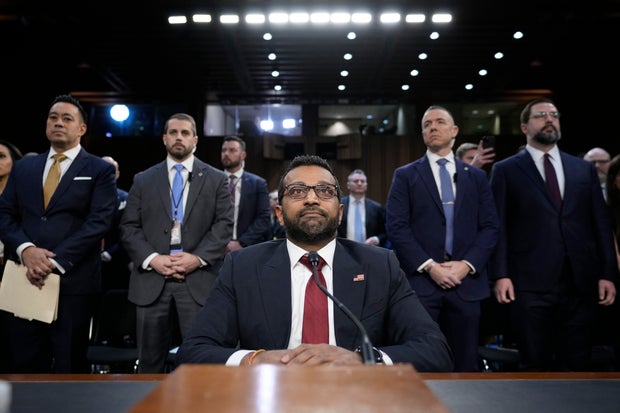Washington — The Senate on Thursday confirmed Kash Patel to serve as director of the FBI, approving a key ally of President Trump to lead the bureau amid warnings from Democrats that he could target the president’s perceived political enemies.
Patel’s nomination was approved in a party-line vote, 51 to 49. Two Republicans — Susan Collins of Maine and Lisa Murkowski of Alaska — joined Democrats in voting to oppose Patel.
FBI directors are appointed to 10-year terms but can be removed by the president. Chris Wray, whom the president appointed in 2017, resigned at the end of the Biden administration after Mr. Trump pledged to fire him.
Collins and Murkowski both issued statements explaining their decision to oppose Patel’s nomination.
Collins cited the recent resignations at the Justice Department and a questionnaire sent to FBI employees about their involvement in cases about the Jan. 6, 2021, assault on the U.S. Capitol. His statements and actions “cast doubt on Mr. Patel’s ability to advance the FBI’s law enforcement mission in a way that is free from the appearance of political motivation,” Collins said.
Murkowski said her opposition “stem[med] from his own prior political activities and how they may influence his leadership.” She said the FBI “must be trusted as the federal agency that roots out crime and corruption, not focused on settling political scores,” and she was “disappointed that when [Patel] had the opportunity to push back on the administration’s decision to force the FBI to provide a list of agents involved in the January 6 investigations and prosecutions, he failed to do so.”
Turmoil at the FBI
 Kash Patel, President Trump’s choice to be director of the FBI, arrives for his confirmation hearing before the Senate Judiciary Committee on Jan. 30, 2025. Ben Curtis / AP
Kash Patel, President Trump’s choice to be director of the FBI, arrives for his confirmation hearing before the Senate Judiciary Committee on Jan. 30, 2025. Ben Curtis / AP
Patel will take the helm of the FBI at a time of turmoil for the nation’s premier law enforcement agency and as it weathers allegations of weaponization from Mr. Trump.
Eight senior bureau officials were asked to step down from their posts or face termination last month as part of broader scrutiny of FBI leadership by the Trump administration. The ousted officials oversaw the bureau’s national security, criminal and cyber divisions, three sources told CBS News.
Deputy Attorney General Emil Bove also ordered Brian Driscoll, who was serving as acting director of the FBI until Patel was installed, to compile a list of all current and former FBI employees who were assigned to the investigation into the Jan. 6 attack on the Capitol for review to “determine whether any additional personnel actions are necessary.”
A survey was also sent to certain FBI employees about their activities related to the Jan. 6 probes, including the extent of their roles.
The FBI turned over the list of more than 5,000 personnel who worked on Jan. 6 cases last week. While it initially contained employee identification numbers instead of names and other information, Driscoll was later ordered to identify employees by name.
Concerns that the list of names could be made public prompted a group of unnamed FBI agents who worked on the Capitol riot investigations to file lawsuits against the Justice Department seeking to prevent disclosure of the information.
The Justice Department and lawyers for the agents reached an agreement last week in which the government would not make public the list of names unless it provided two days’ notice to the agents. Legal proceedings are ongoing in the case.
Patel vowed during his confirmation hearing before the Senate Judiciary Committee late last month that “all FBI employees will be protected from political retribution.”
“Every FBI employee will be held to the absolute same standard and no one will be terminated for case assignments,” he said.
Mr. Trump, meanwhile, has vowed to fire “some” FBI employees who worked on the Jan. 6 investigations and alleged without evidence they are “corrupt.”
Days before the Senate took up his nomination, Sen. Dick Durbin of Illinois, the top Democrat on the Judiciary Committee, asked the Justice Department’s internal watchdog to investigate whether Patel was directing the firing of senior FBI officials as a private citizen.
“It is unacceptable for a nominee with no current role in government, much less at the FBI, to personally direct unjustified and potentially illegal adverse employment actions against senior career FBI leadership and other dedicated, nonpartisan law enforcement officers,” Durbin wrote in a letter to Michael Horowitz, the Justice Department inspector general.
He also alleged that Patel may have perjured himself during his confirmation hearing before the Judiciary Committee. During an exchange with Sen. Cory Booker, a New Jersey Democrat, Patel said he was not aware of any plans or discussions to punish FBI agents or personnel associated with investigations into Mr. Trump before he was elected to a second term.
Born on Long Island, New York, Patel began his career as a public defender in South Florida and worked as a trial attorney in the Justice Department’s National Security Division. He also served as a legal liaison to Joint Special Operations Command.
In 2017, Patel was special counsel on counterterrorism at the House Intelligence Committee, and then worked as a senior committee aide to its then-chairman, former Rep. Devin Nunes, and as senior counsel at the House Reform and Oversight Committee.
During the first Trump administration, Patel worked for the National Security Council, as principal deputy at the Office of the Director of National Intelligence and as chief of staff to acting Defense Secretary Christopher Miller.
Patel joined the board of directors for the Trump Media and Technology Group, which owns the social media platform Truth Social, in April 2022 and served as a national security adviser to the president during the campaign.
Melissa QuinnMelissa Quinn is a politics reporter for CBSNews.com. She has written for outlets including the Washington Examiner, Daily Signal and Alexandria Times. Melissa covers U.S. politics, with a focus on the Supreme Court and federal courts.



